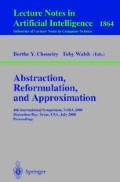Abstract
Scientists and engineers face recurring problems of constructing, testing and modifying numerical simulation programs. The process of coding and revising such simulators is extremely time-consuming, because they are almost always written in conventional programming languages. Scientists and engineers can therefore benefit from software that facilitates construction of programs for simulating physical systems. Our research adapts the methodology of deductive program synthesis to the problem of constructing numerical simulation codes. We have focused on simulators that can be represented as second order functional programs composed of numerical integration and root extraction routines. We have developed a system that uses first order Horn logic to synthesize numerical simulators built from these components. Our approach is based on two ideas: First, we axiomatize only the relationship between integration and differentiation. We neither attempt nor require a complete axiomatization of mathematical analysis. Second, our system uses a representation in which functions are reified as objects. Function objects are encoded as lambda expressions. Our knowledge base includes an axiomatization of term equality in the lambda calculus. It also includes axioms defining the semantics of numerical integration and root extraction routines. We use depth bounded SLD resolution to construct proofs and synthesize programs. Our system has successfully constructed numerical simulators for computational design of jet engine nozzles and sailing yachts, among others. Our results demonstrate that deductive synthesis techniques can be used to construct numerical simulation programs for realistic applications [EM98].
Access this chapter
Tax calculation will be finalised at checkout
Purchases are for personal use only
References
T. Ellman, J. Keane, A. Banerjee, and G. Armhold. A transformation system for interactive reformulation of design optimization strategies. 1998.
T. Ellman, J. Keane, M. Schwabacher, and K. Yao. Multi-level modeling for engineering design optimization. Artificial Intelligence for Engineering Design, Analysis, and Manufacturing, 11(5):357–378, 1997.
T. Ellman. Abstraction via approximate symmetry. In Proceedings of the Thirteenth International Joint Conference on Artificial Intelligence, Chambery, France, August 1993.
T. Ellman. Synthesis of abstraction hierarchies for constraint satisfaction by clustering approximately equivalent objects. In Proceedings of the Tenth International Conference on Machine Learning, Amherst, MA, 1993.
T. Ellman and T. Murata. Deductive synthesis of numerical simulation programs from networks of algebraic and ordinary differential equations. Automated Software Engineering, 5(3), 1998.
Author information
Authors and Affiliations
Editor information
Editors and Affiliations
Rights and permissions
Copyright information
© 2000 Springer-Verlag Berlin Heidelberg
About this paper
Cite this paper
Ellman, T. (2000). Program Synthesis and Transformation Techniques for Simulation, Optimization, and Constraint Satisfaction. In: Choueiry, B.Y., Walsh, T. (eds) Abstraction, Reformulation, and Approximation. SARA 2000. Lecture Notes in Computer Science(), vol 1864. Springer, Berlin, Heidelberg. https://doi.org/10.1007/3-540-44914-0_23
Download citation
DOI: https://doi.org/10.1007/3-540-44914-0_23
Published:
Publisher Name: Springer, Berlin, Heidelberg
Print ISBN: 978-3-540-67839-7
Online ISBN: 978-3-540-44914-0
eBook Packages: Springer Book Archive

